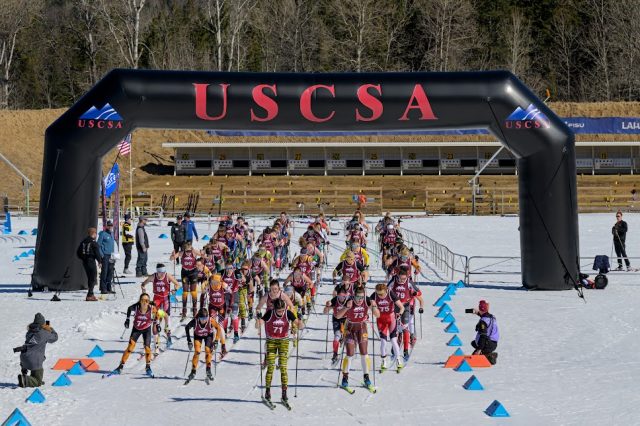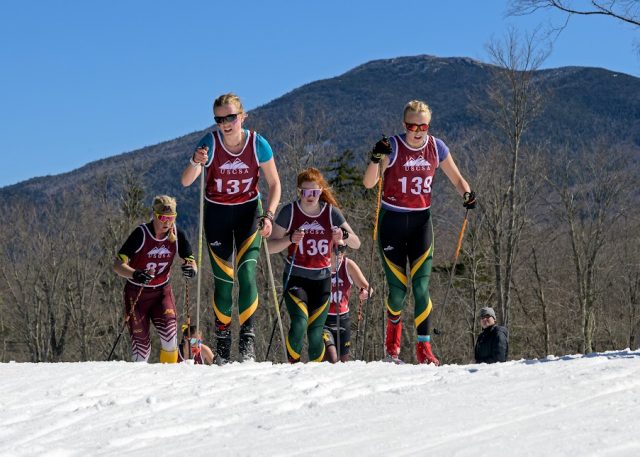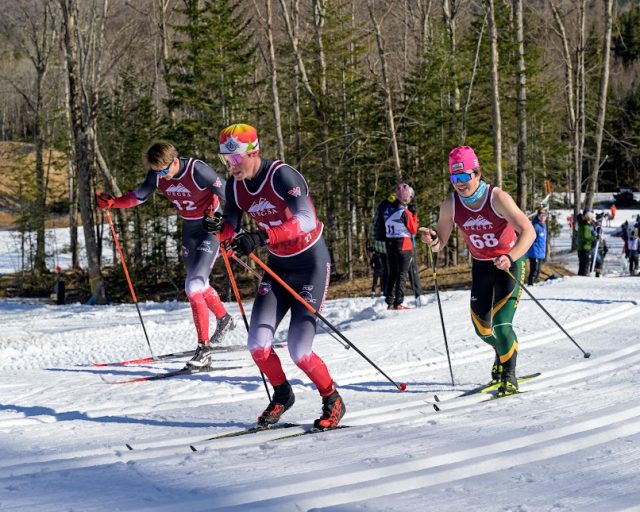
In 2024, the United States Collegiate Ski and Snowboard Association National Championships offered 621 Collegiate athletes (representing 71 colleges and universities) the chance to compete in the sports they love. That level of participation demonstrates that the USCSA is a far bigger league—and hosts a much bigger field—than what’s found at NCAA championships. USCSA also features competitions in an array of snowsports: Alpine Snowboard, Freestyle Snowboard, Nordic Skiing, Alpine Skiing, Freeski.
FasterSkier has covered USCSA competitions and championships in the past (former FasterSkier Editor, Rachel Perkins, wrote of the “Hidden Gem” that is USCSA skiing). In this time when more skiers than ever are itching for intercollegiate competition, it’s high time we did so again. With far more participants—and far more competitions—than NCAA Division I ski competition, USCSA serves a much larger population of collegiate skiers and snowboarders, and assists those young athletes who are still developing within their sports. It also remains possible for any athlete at any US college to compete in USCSA competitions by forming a team on behalf of their school—a process through which the USCSA offers comprehensive assistance. A snowboarder attending the University of South Florida wants to compete in the USCSA? No problem . . .
USCSA National Championship results were reported by Emma Logan and Jay Moyer. The following reportage of Nordic events was excerpted from recent USCSA press releases:

Nordic competition returned to the legendary Mt. Van Hoevenberg to find icy trails after an overnight freeze. After an hour delay to let the snow warm up, athletes competed in a 7.5km freestyle race. Winning their first men’s team championship at Lake Placid was Clarkson University. “Today was a big win for our program,” said Clarkson Head Coach Torin La Liberte. “Having come close many times over the last few years, to finally be back on top of the podium at our home course shows how much work the team has put in to get here.” Paul Smith College’s men’s team placed second followed by Western Colorado University in third. On the women’s side, St Olaf College won the team National Championship, followed by University of Wyoming in second and Paul Smith’s College in third.

After a day off, Nordic athletes competed in their longest race of the week, a 15k Classic Mass Start. Clarkson took home their second team National Championship of the week with a victory for the men. St. Olaf College continued their sweep of the women’s team events, winning their third out of three team National Championships awarded for the week. Rounding out the women’s team podium was the University of Wisconsin at Madison in second and the University of Wyoming in third. Paul Smith’s College and Western Colorado University placed second and third respectively for the men. After their third win, St. Olaf Head Coach Kevin Brochman said, “Our women had another great day winning the 15km classic race. Lots of smiles, fun, sun and great memories from Lake Placid 2024.”
USCSA Season
Teams began their quest to qualify for the U.S. Collegiate Ski and Snowboard National ChampionshipsTM in their local conference competitions, held across 11 conferences spanning the nation, this January. Top teams from each conference attend one of 6 regional championships, which decide who ultimately qualifies to participate in events at the Collegiate National Championship.
The USCSA is the sports federation for collegiate team ski racing and snowboarding in America. The USCSA believes that student-athletes of all levels and abilities should have access to quality and exciting venues of competition. USCSA athletes agree that our team orientation fosters a collaborative approach across their collegiate athletic and academic careers, and often this mentality proves indispensable in their adult lives and careers. The organization includes 213 colleges from coast to coast, fielding 4,765 male and female, alpine, freestyle, cross-country, snowboarding and nordic ski jumping athletes in over 300 events annually.
For more information, please contact jmoyer@uscsa.org



